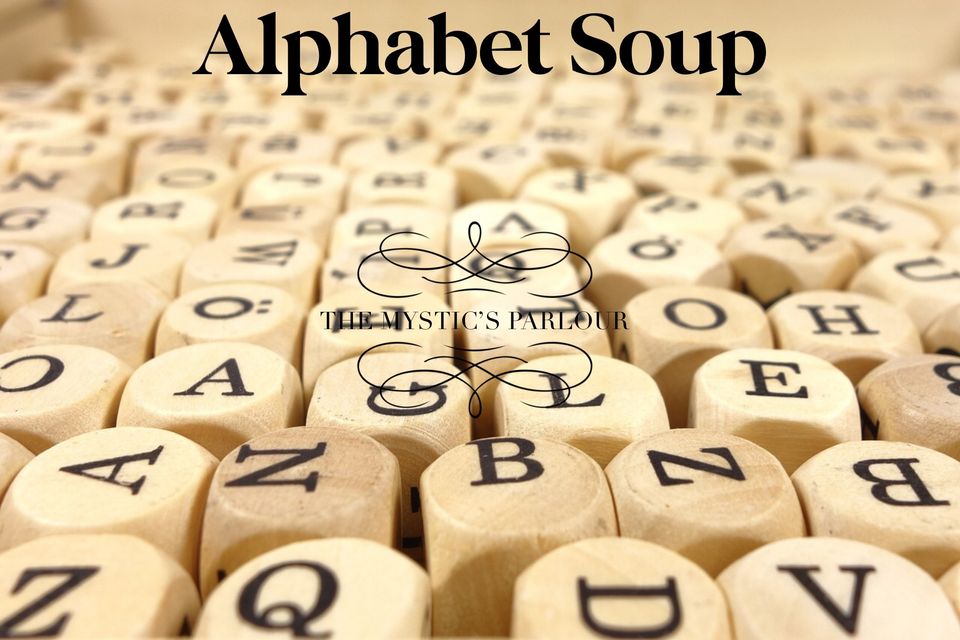Alphabet Soup

Authenticity, transparency, integrity, our ‘real’ selves. These words are the current hashtags and buzzwords on every social media platform, it seems, touted by influencers and content creators. It’s a good thing to demonstrate these qualities. It’s also impossible for anyone to do so flawlessly if they’re putting themselves on display 24/7. I’ll leave the discussion around the many reasons against this for another time. That horse has left the barn and I want to focus, in part, on the use of social media for connection and purpose.
One of the pitfalls of social media is that it creates and enables arbiters of every possible subject and scenario. It’s prudent to practice a bit of healthy skepticism when someone claims to be the arbiter, of basically any topic. There are enough people in both the pavement and virtual worlds presenting themselves as leaders, gurus, and the like. We don’t need to create them in our heads. It's worth noting the old adage that offers this advice: "when someone tells you who they are, believe them".
For example, I’ve been following an account that focuses on the authentic folklore and traditions of a specific culture. The account is run by the owners and administrators of an online school who are educated and extremely knowledgeable in all things related to their curriculum. I’ve completed several of the courses, some were free and others I paid for the content. Overall, I have been quite satisfied with the quality of the material and information provided.
At the end of April, this account shared a post that listed various practices traditions related to the culture, and the reasons (or superstitions, depending on your take) behind them. One practice in particular, clearly emphasized that no money should be spent during Beltane, which is a 24-hour period between April 30th and May 1st. The reason being, if any money leaves your wallet during this time, money won't stay in your wallet for the coming year. The post also provided a detailed 'workaround’, in case of emergency, but emphasized a strong caution against spending money, even if this were the case. The post was presented as the author's personal practice.
Not long after, the person who runs the account posted photos of themselves at a brunch event, and also shopping and barhopping throughout the same period they cautioned in their post. It appears they had a wonderful time, and I honestly couldn’t care less about the state of their own wallet, but this was in direct contradiction to their ‘official’ stance on not spending any money during this 24-hour period. Posting information to help people to decide for themselves is fine and commendable. Cultivating your online presence to showcase yourself as an expert, and the arbiter, of sacred traditions, then acting in a contradictory manner is less than authentic, to say the least.
I’d been on the fence about this account for a while. The information they provide is accurate, detailed and helpful, but as is often the case, there’s a human behind the curtain. One that really isn't very nice, which helped me acknowledge that I don’t like how they treat their students and customers, and that I should move on, which I have. I’ve shared information and content from them in the past, but I won’t be doing so in the future. For the record, this is the only place I will make my feelings about this public.
This entire train of thought ties in with my recent, more serious, study of the Myers-Briggs Type Indicator (MBTI). How can you be authentic if you don't know who you are, right? For years I had to look up whether Myers or Briggs came first and couldn’t remember my own MBTI (which is ISFP). Now that I’ve taken the time to study the structure and basis behind it, I’m diving into the deep end, incorporating the method into my understanding of the court cards in the tarot. Court cards are usually the bane of any reading (for most readers) because of their rigid and archaic historical connotations. Genders, along with gender-roles are much more openly fluid now, than they were when the Rider Waite Smith deck was published. Redefining the hierarchy allows for a more accurate depiction of who we are at this time in history. My goal is to remain in alignment with my true nature so that I can help others find, or find their way back to, their own. Breaking down the gender and status of the court cards makes it possible for more people to connect with the human energy these cards are meant to relay.
Sixteen different letter combinations are a lot of alphabet soup. Each one represents a structure for how we show up, for ourselves and for others. It’s not possible to analyze, or even learn, the MBTI for every person with whom we interact, nor is it necessary. It’s not as important to know who someone is as it is to know who they are to us. Everyone we meet is a mirror of ourselves. Rather than determining whether or not we like someone, it’s more beneficial for us to know if we like ourselves when we're around them. This reflection showcases the best and worst qualities that make us who we are. It can be amplified or muted by external factors such as other people, alcohol and the nature of the surrounding environment. You may despise your boss, but also be surprised to find you enjoy working with them on a volunteer project outside of the office, where you have a common interest or goal.
Not every aspect of every person fits neatly into one of sixteen boxes, each a cube made up of four letters, because labels are both restrictive and imperfect. But by developing a better understanding of the common framework of how we function as individuals in society, we also deepen our connection with ourselves and those around us. I’m incorporating this concept to add another layer to my tarot practice. This week, I’m reading tarot for a test group of 23 people who agreed to share their MBTI with me by assigning each person a court card based on the qualities of their type. I’ll then combine the intuitive aspects of the cards that are located immediately before, and after, where their assigned card falls in the deck. This method can be modified and expanded to provide guidance on any number of questions or issues the querent may have.
That’s the plan, anyway. The early stages were occupied with constructing a spreadsheet and legend, then analyzing the percentages of each type based on the respondents. I did that just because I found it interesting that the least common MBTIs were the most common among the respondents to my request. That must say something about the kind of people I know, as well as my nature, and I like it.
So anyway, here I am, practicing unqualified armchair psychology with tarot and an alphabet soup of letters depicting personality traits. I know absolutely nothing about psychology and only enough about tarot to be dangerous so this should be interesting. At the very least it will give me street cred with those who appreciate a means of measurement in esoteric pursuits (as if that were possible). Measurable or not, it's deepened my understanding of how people, including ourselves, show up in a tarot reading.
I’m using social media to connect me with people who can help me research a new (to me) method of providing counsel and advice through tarot that can, in turn, help provide insight and innovation to the people for whom I read. Meaningful connection is the single, most important, use of social media. I don’t have to try to be authentic or transparent or ‘real’ with my friends. When I know and embrace my true nature, everything else falls into place.
I don’t write this column as a means of solicitation for any of my services, but if you’re interested in hearing more about what I’m doing with this, you can contact me through messenger on my social channels or the email address below. I’m happy to share more about my experience while designing the process or provide you with a reading should you wish to purchase one, whichever you prefer.
If you’re one of the 23 people who graciously agreed to help me with my tarot project, and I think many of you also support my work here, your reading is coming soon. I appreciate you all so very much.
If you enjoy my weekly column, would you please consider sharing by forwarding this email or the link to my site? The Mystic’s Parlour (the-mystics-parlour.ghost.io)
Your continued support is important to me, and your feedback is always welcome. I’d love to hear your stories if you’re inclined to share. You can contact me via email at themysticsparlour@gmail.com.
